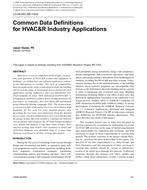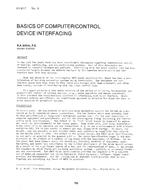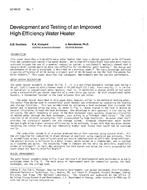The problem of determining the heat transfer processes in residences and commercial structures requires accurate analytical models if one is to adequately define energy conservation measures. Various energy analysis computer simulation programs are presently available for use in the public sector. Among these programs, DOE-2.1B represents the state of the art in determining building thermal loads and energy usage quantities. However, the current version of DOE-2.1B does not rigorously deal with the problem of heat transfer in earth-contact structures. This situation, although minor when compared with the relatively comprehensive methodology utilized for the overall energy analysis of traditional above-grade buildings, nevertheless detracts from the primary goal of a well-defined simulation.
Recently, a research version of DOE-2.1B has been created with the addition of an algorithm that is used to analyze earth-contact systems such as basements, crawl spaces, slabs, and berms. This paper describes the methodology used in the DOE-2.1B program revisions and gives numerous examples regarding its applications. The mathematical technique employs the generation of a two-dimensional finite-element model from simplified user input definitions from which weekly response factors are generated for those surfaces in contact with the ground. Weekly averaged weather parameters provide the external excitations used to define the thermal load within the earth-contact space.
Citation: ASHRAE Transactions, 1985, vol. 91, pt. 1A, Chicago, IL
Product Details
- Published:
- 1985
- Number of Pages:
- 15
- File Size:
- 1 file , 1.3 MB
- Product Code(s):
- D-CH-85-2855


